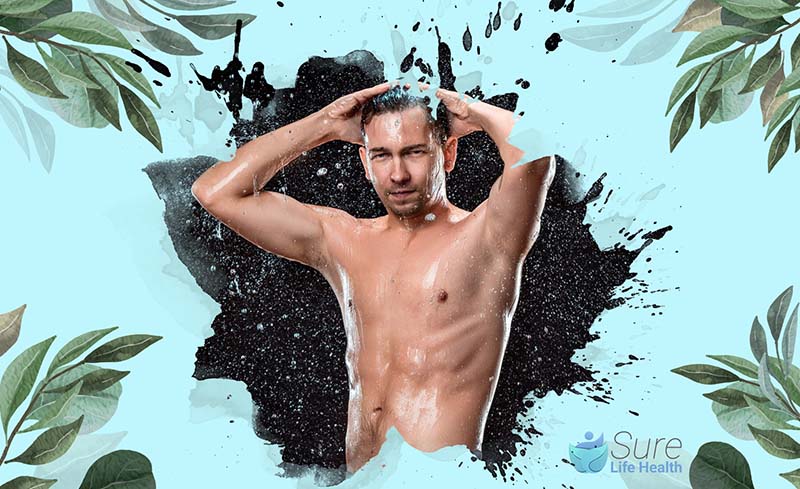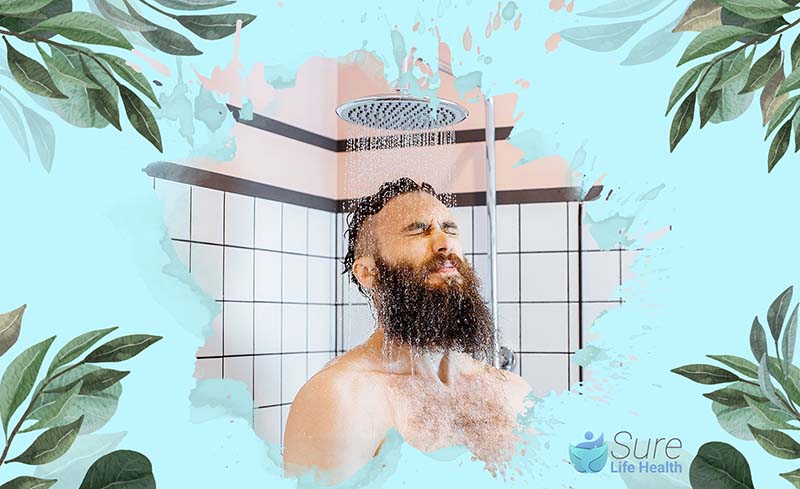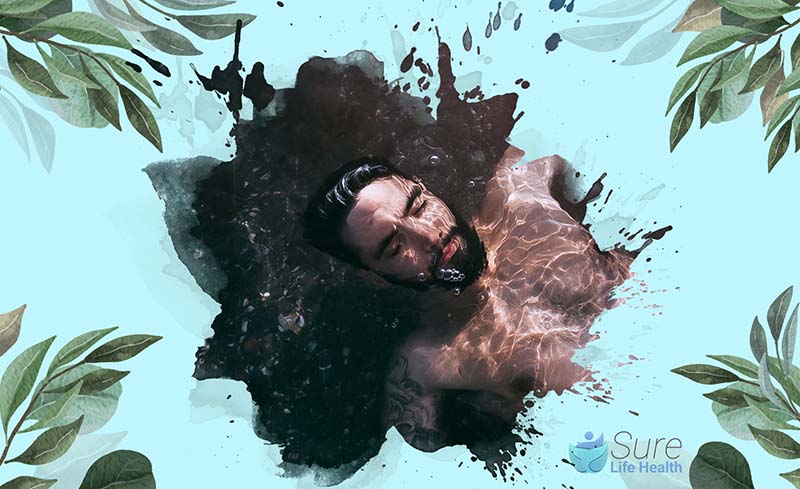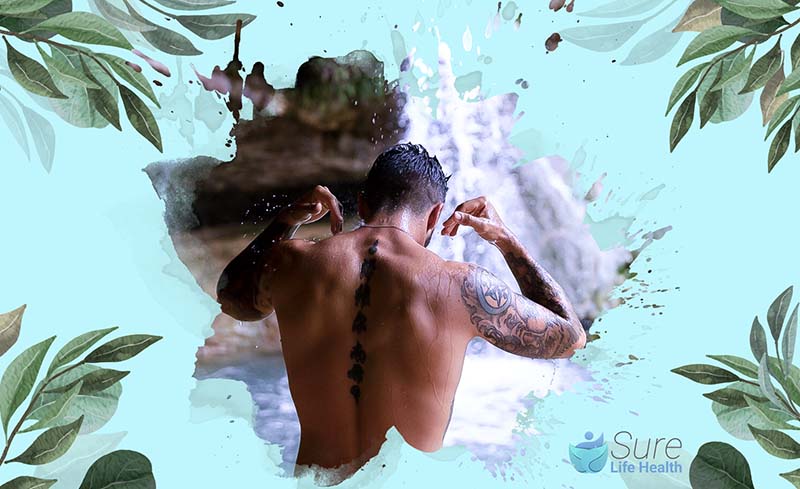Nowadays, more guys are talking about low testosterone. When it comes to dealing with this issue, many prefer natural solutions over rushing to the doctor. One interesting suggestion making the rounds, and central to our inquiry, ‘Do Cold Showers Increase Testosterone?’, is cold showers. Some folks believe that these chilly rinses can boost testosterone levels.
But let’s get real. While cold showers are good for you in many ways, the idea that they’ll significantly jack up your testosterone might just be a myth.
To clear up the confusion surrounding the question ‘Do Cold Showers Increase Testosterone?’, we dug into the research on cold showers and testosterone. Here’s what we found.
Do Cold Showers Boost Testosterone?
You might assume that chilling the scrotum could boost testosterone production, but any potential impact would be temporary. According to Miller, both cold and hot showers have short-lived effects. “Whatever effect it has, that effect wears off fairly quickly,” he explains.
Urologist David Shusterman, M.D., agrees. While some cultures believe in the rejuvenating power of cold water immersion, it’s not an effective treatment for low testosterone levels.
Notes: Cold showers might give you a temporary boost, but it won’t stick around for long. Instead of relying solely on cold showers, consider other lifestyle changes or consult a healthcare professional for personalized advice on managing testosterone levels.

Explanation of Cold Showers to Increase Testosterone
Before diving into the research, it’s essential to grasp how temperature affects testicular function.
Testosterone, the primary male hormone, is produced in the testicles, which are located outside the body in the scrotum. This positioning helps maintain the ideal temperature for sperm production. It’s this connection that leads some to believe that cold showers might influence testosterone levels. However, scientific evidence supporting this idea is limited.
Early studies indicate that maintaining the right temperature is crucial for DNA and RNA production, as well as protein synthesis, all of which contribute to optimal sperm production. Further research involving animal subjects revealed that exposing the testicles to higher temperatures than necessary leads to decreased sperm production due to testicular shrinkage induced by reduced testosterone levels.
Exploring this topic further, a study on the effects of physical exercise and cold stimulation on testosterone levels found that while exercise increased testosterone production by influencing the Leutinizing Hormone (LH), cold water exposure led to a 10% decrease in testosterone levels.
Another study from 2013 noted a rise in sperm quality and concentration during colder weather compared to warmer temperatures.
The only clinical trial showing a positive response to testosterone was a 2017 study on the effects of whole-body cryotherapy on sprint-trained athletes. It reported a temporary increase in testosterone levels for 24 hours following exposure to extreme cold temperatures within 20 minutes of a sprint-training session. However, it’s crucial to note that this effect was due to extreme cold temperature exposure, not cold water specifically. Thus, the impact of cold showers on testosterone remains inconclusive based on this study.
Notes: While the idea of cold showers affecting testosterone levels is intriguing, current research doesn’t offer strong support for it. It’s essential to consider various factors that influence hormone levels and not rely solely on one method for boosting testosterone. Always consult with a healthcare professional for personalized advice on hormone management and overall health.

4 Other Health Benefits of Cold Showers
While the link between cold showers and testosterone production remains uncertain, there are several other perks to taking a dip in cold water:
Supports Stress Reduction
Cold showers have demonstrated potential in reducing symptoms of depression and anxiety.
Some individuals find that the shock of cold water helps them mentally reset, diverting attention away from stressors.
Strengthen The Immune System
Research suggests that exposure to cold water may have a modest yet ambiguous impact on the immune system.
A 2014 study revealed that cold water immersion triggers the release of adrenaline, leading to increased production of anti-inflammatory substances and reduced inflammation response to infections.
This may bolster the body’s ability to fend off illness. Additionally, a 2016 study observed a 29% decrease in work absences among participants who took cold showers, indicating potential immune-boosting effects.
Recover Quickly After Exercise
Cold water immersion post-exercise could aid in faster recovery, albeit to a limited extent. Case reports and studies have shown reduced pain and tenderness after intense workouts, potentially allowing for swifter return to physical activities.
While the evidence is mixed, some research suggests that cold water immersion, especially when combined with hot water exposure or conducted at specific temperatures and durations, may alleviate muscle soreness and aid in recovery.
Increase Metabolism
Cold temperatures have been linked to the activation of brown fat, a type of fat associated with a healthy body mass index. Studies have found a correlation between cold exposure and the activation of brown fat, suggesting that individuals with higher levels of brown fat may have healthier white fat levels and better overall metabolic health.
Notes: While cold showers may not be a magic bullet for every health concern, they offer a range of potential benefits beyond testosterone. Incorporating cold showers into your routine may support overall well-being, but it’s essential to consider individual preferences and consult with a healthcare professional for personalized advice.

How to Take a Cold Shower Effectively
To maximize the benefits of cold showers without causing discomfort, consider these tips:
- Start slow: Ease into cold showers gradually. Instead of jumping straight into ice-cold water, adjust the temperature gradually throughout the shower or make each successive shower slightly colder than the last. Begin with warm water, then transition to lukewarm, followed by cool, before embracing the cold completely.
- Take it easy: Rather than subjecting your entire body to instant cold, start by splashing cold water on your hands, feet, and face to acclimate to the temperature gradually. This gradual approach reduces the shock to your system.
- Be prepared: Have a towel or a warm area ready nearby for when you finish your cold shower. This allows you to warm up quickly and prevents you from shivering uncomfortably after exposure to cold water.
- Consistency is key: While you may not notice immediate changes, consistency is crucial for reaping the benefits of cold showers. Incorporate cold showers into your daily routine at the same time each day to allow your body to adjust and become more receptive to regular cold exposure.

Can Cold Shower Cause Erectile Dysfunction?
Cold showers are unlikely to cause Erectile Dysfunction (ED). In fact, evidence suggests that cold exposure, such as cold showers or ice baths, may offer potential benefits for men’s sexual health.
These benefits include improved blood flow, testosterone levels, and overall reproductive health. Studies have shown that cold water therapy can increase testosterone levels, enhance sexual health, and positively impact intimate relationships.
While ED can result from various factors, cold showers are not a direct cause based on available information.
Precautions When Taking Cold Shower
However, cold showers may not be suitable for everyone. Individuals with the following conditions should avoid them:
- High blood pressure
- Heart condition or heart disease
- Overheated or feverish (hyperthermia) from an illness or intense exercise
- Recently recovered from an illness, such as flu or cold
- 5. Immune system disorder or compromised immune system from an illness
- 6. Feeling overexhausted or stressed, as cold showers can add extra stress to the body
Moreover, if you have depression or a mental health condition, cold water therapy should not replace your medication.
Additionally, if you reside in a cold climate where exposure to cold water may lead to hypothermia, it’s best to avoid cold showers altogether.
Notes: While cold showers offer potential health benefits, it’s crucial to consider individual health conditions and consult with a healthcare professional before incorporating them into your routine. Always prioritize your well-being and safety when trying new wellness practices.
Conclusion
In conclusion, while the link between cold showers and testosterone levels remains uncertain, we’ve uncovered a wealth of information about the potential benefits of this invigorating practice.
Whether you’re seeking improved mood, better immune function, or faster workout recovery, cold showers may offer surprising advantages. Keep asking, “Do cold showers increase testosterone?” and keep seeking answers as you embark on your wellness quest.
Be sure to explore more insightful blogs from Sure Life Health, where we continue to shed light on the latest trends and breakthroughs in health and wellness.
Professor Gaye Cunnane, PhD, MB, FRCPI
As the Director of Health and Wellbeing at RCPI, Professor Gaye Cunnane is at the helm of initiatives aimed at enhancing the health and well-being of RCPI Trainers and Trainees. Her role extends beyond administration; she is also a respected clinical professor of rheumatology and a consultant rheumatologist at Trinity College Dublin (TCD) and St James’s Hospital. Prof. Cunnane’s medical journey began at TCD, where she graduated from medical school, and her path has been marked by both clinical and academic excellence.
After completing her basic clinical training in medicine, she embarked on PhD studies at University College Dublin and St Vincent’s University Hospital. Her research during this period was focused on prognostic markers in early inflammatory arthritis, a project that saw her collaborating with esteemed universities across Europe, including in Switzerland, The Netherlands, the UK, and Sweden.
Prof. Cunnane’s career took her to the University of California, San Francisco, where she spent three years delving into research on new treatments for lupus. Her academic prowess led her to the University of Leeds in 2001 as a senior lecturer, before returning to Ireland in 2003 to assume her current roles. She has also served as the National Specialty Director for Rheumatology training in Ireland, Programme Director for Basic Specialist Training with RCPI, and as a past President of the Irish Society for Rheumatology.
PUBLISHED ARTICLES
“Rheumatic disease differentiation using immunoglobulin G sugar printing by high-density electrophoresis”: Published in The Journal of Rheumatology, this study reflects her in-depth investigation into rheumatic diseases.
“Benefits of exercise in patients with rheumatoid arthritis: a randomized controlled trial”: This research work, highlighting the positive impact of exercise on rheumatoid arthritis, underscores Prof. Cunnane’s dedication to practical, patient-centered research.
Additionally, Prof. Cunnane has made notable contributions to the Annals of the Rheumatic Diseases, discussing early referral, diagnosis, and treatment of rheumatoid arthritis. She has also been involved in a study on the NCBI platform investigating exercise benefits in rheumatoid arthritis patients.
Professor Gaye Cunnane’s career is a testament to her commitment to improving patient outcomes in rheumatology through rigorous research, clinical excellence, and dedicated teaching. Her work continues to influence the field of rheumatology, both in Ireland and internationally.

